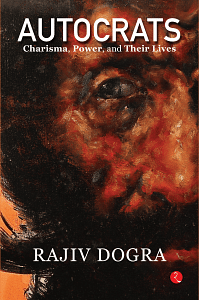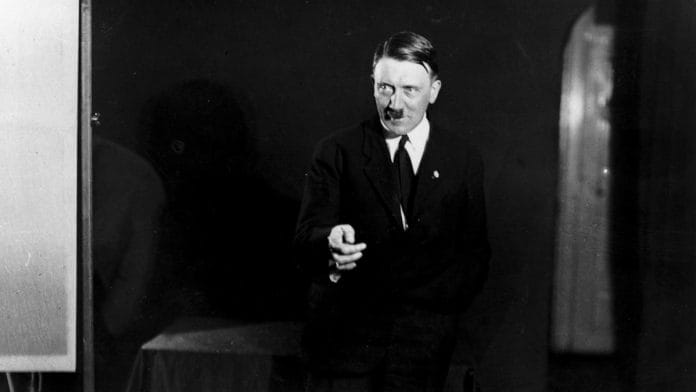A lot also depends on the company a dictator keeps at his dinner table, who he eats with and how he eats. The entire process can affect his mood, his worldview, and his bowels. The stress and strains of office also take a toll on their digestive systems as no matter what the facade, and how much their acts may terrify the population, deep within they are insecure.
Hitler, Mao and Mussolini suffered from one type of stomach problem or the other. Hitler, in particular, suffered from chronic flatulence. He was so troubled by it that in desperation he allowed a quack, Dr Theodor Morell, to dose him with 28 different medicines, including one made from the extract of faeces of healthy young German soldiers. On the other hand, the famously flatulent Gaddafi seemed to have been untroubled by this affliction. He unabashedly farted on!
Another surprise about Hitler was the type of food he ate. It is hard to imagine a man such as him could be a vegetarian. The reason for it was his belief that a meatless diet would relieve his flatulence and constipation. Towards the last stages of his life, he took only clear soup and mashed potatoes. Before he gave up meat because of gastrointestinal problems, Hitler was fond of eating the exotic dish Petits Poussins à la Hambourg. It is a preparation of a fledgling pigeon or squab stuffed with tongue, liver and pistachio nuts.
All dictators are not simple or predictable in their taste. The food choice of Kim Jong-Il was varied and exotic. His favourite foods were shark-fin soup, salo, and dog-meat soup, which he believed gave him immunity and virility. He had some other idiosyncrasies. One of those maintains that he had a team of women to make sure every single grain of rice that was served to him was identical in size, shape, and colour. His preferred tipple was cognac, so much so that he was said to be one of Hennessy’s biggest customers.
All this is useful information, but it is not enough to be encyclopaedic. The reason for it is simple—most aides of a dictator do not know much about the personal life of a dictator. A chef is the only exception, and he is in the best position to reveal the food habits of the dictator he served. But chefs seldom open up. They remain afraid and reluctant to talk during the lifetime of dictators, and that sense of fear prevails even after a dictator has passed on. So, a combination of half-gossip and half-baked knowledge is all we get generally.
Some of it is wild guess based on the degree of cruelty of the dictator. For instance, a rumour in Cambodia maintained that Pol Pot liked to eat the heart of cobra. As his cook explained: ‘I cooked cobra for Pol Pot…First, kill the cobra. Then cut off its head and hang it on a tree for the poison to dry in the sun, away from the children. Collect the snake blood in a cup and serve it with white wine. Chop the cobra into little pieces and mash it into a pulp with a handful of peanuts. Add boiling water, bitter leaf of the vine, the herb of the lemon grass and yellow ground ginger. Simmer for one hour. Serves one.’
There is a belief in some countries like China and Cambodia that cobra soup has aphrodisiac qualities, so it was vicariously tempting for people to believe that Pol Pot might be doing one better and eating the heart of the cobra.
But another rumour maintains that this earlier rumour was false. After he was removed, it emerged that Pol Pot did not like the sight of snakes. Like many other Cambodians, he ate chicken and fish. He had his preferences, of course. He didn’t like just any other papaya salad; he liked it made with pieces of crab meat or some fish paté. Whatever be the truth, people would like to believe his cook.
Mussolini preferred to eat his meals at home with his wife, Rachele, and their five children. But he was a stickler for order even at his daily meal. Everyone had to be seated and served at the table before his arrival. Mussolini rarely ate pasta or meat and called French food ‘useless’. His favourite food was a salad made of raw garlic and olive oil, which he thought was good for his heart. His wife thought it made him smell of an odious garlic stink, so after dinner she retreated to a separate room. He also drank up to three quarts of milk a day to quell his stomach aches. Ironically, he tried to hide his milk habit from Hitler, fearing the Fuhrer would perceive this as ‘unfascist’.
Some of the otherwise severe dictators were simpletons in matters of food. Ceausescu was one of them. His favourite food when he dined at home was stew made with a whole chicken, including its feet and beak. When he was on a visit abroad, he insisted on his Romanian chefs bringing all his food on the trip. Once, when he was visiting Yugoslavia, his host Tito was shocked by Ceausescu’s insistence on drinking raw vegetable juice through a straw at the formal banquet, where he avoided all solids.
Ceausescu was essentially a quiet man of simple tastes. It was his wife Elena who was a terror with their domestic staff, punishing them with severe penalties for the smallest mistake like breaking a piece of china. Ceausescu, however, was courteous with his staff. If he got up for a midnight snack, he would not wake them up. Instead, he went down to the kitchen to make himself a sandwich.
Some of the other dictators were not similarly considerate. Rather, there are examples of dictators who go to the other extreme. Once, when one of Idi Amin’s sons had a severe stomach upset, Amin went to the kitchen, took out his pistol and pointed it towards the head of the first chef he saw. ‘If the kid dies, I’m going to kill all of you,’ he shouted at him and the rest of the kitchen staff.
However, such threats are best avoided even by a dictator, because a chef has a unique position in this matter. If he chooses to, he has the ability to poison the dictator. Or, at the very least, make an attempt to do so. Therefore, a chef ’s position is a delicate one based essentially on trust. Whether it is out of concern for personal safety, or proximity, it is not uncommon to find a dictator treating his personal staff well. Saddam Hussein gave expensive gifts like gold watches to his chef. But if he didn’t like the food, he would impose a fine on the chef and make him pay it in Iraqi dinars for the ingredients used in the cooking process.
As an aside, it should be mentioned that besides the chef, a dictator is also vulnerable to the decision of the food taster. An indication of what a food taster goes through was provided by one such long after Hitler’s death. Margot Woelk was among the fifteen young women employed to taste his food. She recalled, ‘The food was delicious, only the best vegetables, asparagus, bell peppers, everything you can imagine. And always with a side of rice or pasta. But this constant fear—we knew of all those poisoning rumors and could never enjoy the food. Every day we feared it was going to be our last meal.’

This excerpt from Rajiv Dogra’s ‘Autocrats: Charisma, Power, and Their Lives’ has been published with permission from Rupa Publications.






